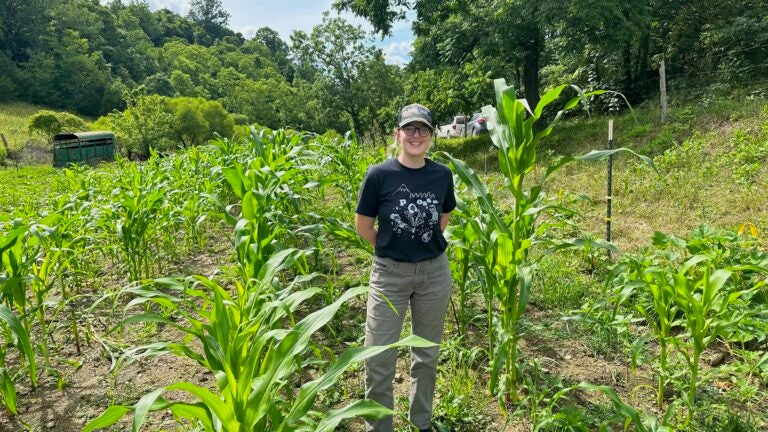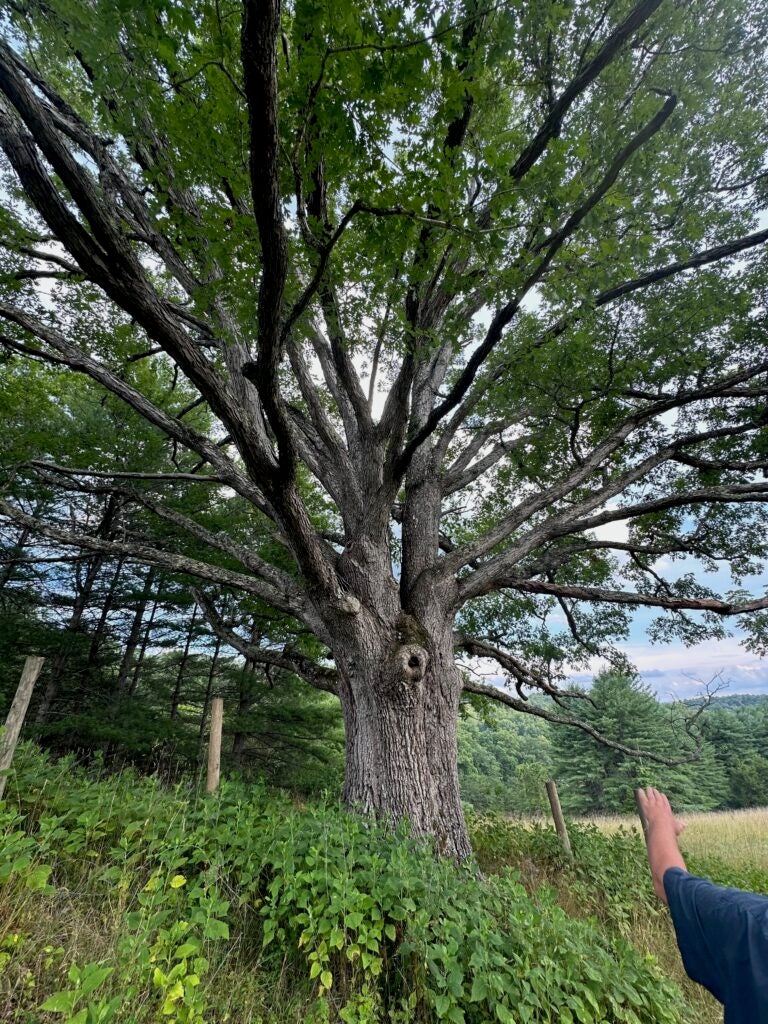
2024 Wrigley Institute Graduate Fellow Maggie Davis visits a farm in Monroe County, West Virginia, to gather field data about the Mountain Valley Pipeline (MVP), a complex and controversial issue in the state. (Courtesy of Maggie Davis)
Field Research Along the Mountain Valley Pipeline
One July afternoon in Monroe County, West Virginia, I walked with a landowner and farmer along part of the Mountain Valley Pipeline (MVP), a 303-mile fracked-natural-gas pipeline extending from northwestern West Virginia to southern Virginia. As we walked through tall grass and white and purple wildflowers, we came across a massive oak tree. We had to crane our necks to take in the full span of its limbs—when measured, the farmer told me, the tree’s canopy stretched half the length of a football field. He recounted how MVP initially planned to route through this ridge, threatening the centuries-old oak tree, which stands uphill from his great-grandfather’s barn and his own organic farm in the valley below. After experts and reporters visited, they published a story about the oak. “The next week, this was off the route. They saved this tree,” he tells me.

As a fourth-year sociology PhD candidate, I joined him during my dissertation field research on MVP, a complex and controversial social issue in my home state of West Virginia. Reflecting on the oak dispute, the farmer described a single conflict within a decade-long series of disputes over the pipeline’s route, construction, and management. Ten years after it was first proposed, MVP went into service this June, just one month after the pipeline ruptured in Virginia during pressure testing. Initially projected for completion in 2018, MVP was delayed and suspended numerous times due to legal disputes over its compliance with environmental and safety regulations. But Congress cited MVP’s completion as “required in the national interest” and passed the Fiscal Responsibility Act (FRA) in summer 2023, raising the debt ceiling and mandating approvals for all outstanding pipeline permits without judicial review.
That afternoon in Monroe County, one of many trips I’ve taken as a participant observer gathering MVP field data, the farmer and I documented damages from the project’s final phase. The Federal Energy Regulatory Commission (FERC), which regulates interstate pipelines such as MVP, has received thousands of comments about the project via its online docket. Comments report issues like water contamination and flooding, soil erosion, damage to stream channels, harm to properties and sensitive topographies, and violations of approved plans and laws. West Virginia’s Monroe and Summers counties, and Virginia’s Craig, Giles, Roanoke, and Montgomery counties, are key points of contention along the MVP route. They are home to karst terrain (meaning that sinkholes and caves lie on and below the earth’s surface), sensitive water resources like springs, and some of the route’s steepest slopes. Documenting these features puts communities in contact with the constellation of MVP company representatives, consultants, contractors, engineers, and government agencies managing the pipeline.
Guided by science and technology studies and experiences in the field, my dissertation project examines how natural gas infrastructures animate public life. I’ve found it compelling that MVP consistently evokes themes of life and well-being (or their opposites) across different scales, locales, and frames of reference. For those living along and monitoring its route, the pipeline can signify an uncertain future fraught with environmental and safety concerns. For residents in areas experiencing industrial transition, it can suggest economic stability. For federal decision-makers, it symbolizes national security. In each case, the pipeline is not a fixed and stable entity, but a dynamic object through which we process anxieties and ideas about the future.
I am incredibly grateful to the USC Wrigley Institute for supporting my research. Their fellowship funded my field travel along the pipeline route and connected me with scholars from diverse disciplines. As a social scientist studying how people interact with the physical sciences in everyday life, it has been invaluable for me to engage with scientists working on the Earth’s surface and subsurface. Through the Wrigley Institute, for example, I gained crucial insights on stream sedimentation from an Earth sciences PhD candidate in my fellowship cohort, informing my fieldwork this summer.
On the Monroe County farm I visited, a basin was set up to collect sediment that could impact nearby water sources. As we took photos and notes, the owner pointed out places where water had run over and off the basin. Then, reflecting again upon when MVP was first planned, he expressed frustration: “You see all the wetlands over here? They came through here and said ‘we have finished surveying Monroe County and there are no springs or wetlands within 200 feet of the pipeline route’.” He pointed to two springs beside the route. “They must not have counted there, and there.” Clearly, there is a yawning disconnect between on-the-ground conditions and official claims; a study of both can illuminate how people and institutions understand one another.
Maggie Davis is supported by the USC Dornsife Wrigley Institute Graduate Fellowship.